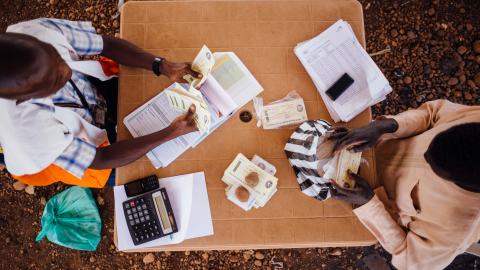
Humanitarian financing
Humanitarian financing, in its current form, is not equipped to address the number and scale of prolonged emergencies that the world is facing. Reforms are crucial to maximise limited funds for field programs, to ensure funding for crucial early action and to tackle longer-term goals in contexts of protracted crises.
Our Commitments
- We are a privately funded global development portfolio is worth over USD 1 billion per year. To help protect development gains and bridge the relief-development divide, we will commit to allocate up to 20% of our development funding as a crisis modifier when our national affiliates decide this is needed to prepare and respond to humanitarian needs when disasters strike.
- We will seek to deliver 50% of its humanitarian aid through a multi-sectoral and multi-purpose cash first approach by 2020, where context appropriate, such as in urban settings. This will leverage digital payment and identification systems and shared value partnerships with others, such as with MasterCard Corp, to track the delivery of assistance from donor to beneficiary
Despite the increasing generosity of donors, the humanitarian finance system is unable to meet the needs from the growing number and frequency of prolonged complex crises.
The daunting scale of the humanitarian funding gap and the many documented, and seemingly intractable humanitarian financing challenges, are increasingly apparent. The changing nature of crises has resulted in a widening gap between humanitarian needs and available resources. Since 2004, the funding requirements of inter-agency humanitarian appeals have increased six fold, from $3.4 billion to $19.5 billion in 2015 (UNGA, 2016).
Financing for humanitarian assistance is designed to respond to the symptoms of crises and is not adequate or appropriate to address the underlying factors and drivers of emergencies. Despite ever increasing commitments from major donors, contributions are not keeping pace with expanding needs. Humanitarian financing is overstretched. Each year humanitarian action is at least 30% underfunded (GHA, 2015).
The need to reform humanitarian finance has been laid out in a number of key reports including Looking Beyond the Crisis (CAFOD, FAO, WVI – and supported by the IASC HFTT), the Too Important to Fail High Level Panel report on Humanitarian Financing, the Secretary General’s Agenda for Humanity and the ICVA Briefing Paper on the Grand Bargain.
Read more
- Download the full report, Future Humanitarian Financing: Looking Beyond the Crisis.
- Is closing the humanitarian funding gap as simple as saying yes (to new sources of funds)? Opinion piece by Julian Srodecki, World Vision's Technical Director for Humanitarian Grants.
The Grand Bargain, articulated the High Level Panel report Too Important to Fail, presents an opportunity for radical reform of humanitarian funding models so that are more efficient, transparent and accountable.
The current humanitarian finance system sees funding flow through various routes from the primary donor through intermediaries to the final implementer. Rapid-onset natural disasters, responses to complex and protracted emergencies, rural crises (compared with urban ones), national emergencies and regional cross-border crises must make use of the same general funding mechanisms. As a result, funding is not context appropriate, is not targeted according to need and often arrives too late, with funding cycles that are too short.
The “Grand Bargain” proposed more flexible funding from donors in exchange for more transparency and cost-consciousness in funding routes, increasing the funds available to people in need. More transparency around funding routes allows donors to allocate funds through the most appropriate and efficient route for the specific context and emergency.
Read more
- Download the High-Level Panel Report on Humanitarian Financing, Too Important to Fail.
- What does the Grand Bargain needs to do to succeed at the World Humanitarian Summit? Opinion piece by Julian Srodecki, World Vision's Technical Director for Humanitarian Grants.
- Making a bargain that is truly grand for people impacted by disaster. Opinion piece by Julian Srodecki, World Vision's Technical Director for Humanitarian Grants.
- Why isn't there enough money? Two ideas to transform humanitarian financing. Opinion piece by Julian Srodecki, World Vision's Technical Director for Humanitarian Grants.
Multi-year funding is key to overcoming the relief-development divide to address the complex issues of need.
Driven by the need to address complex issues on the ground with long-term solutions in prolonged crises such as Syria and South Sudan, the recent UN Secretary-General’s Report, One Humanity: Shared Responsibility, highlighted the need for a 15-year perspective on humanitarian crises.
A critical piece of the Grand Bargain discussion is the idea of multi-year funding. According to UNHCR, the average refugee is now displaced for 17 years (UNHCR, 2006, p38). Two thirds of humanitarian assistance goes to long-term or protracted crises, such as Syria or South Sudan (GHA, 2015, p.22). Implementers like us are frequently faced with the challenge of shaping, or stitching together, long-term programmes using short-term funding available for short-term projects that are tied to short-term results.
Reducing the frequency of award processes and increasing the value of grants will help NGOs reduce the costs of winning grants and time spent acquiring funding resulting in less paperwork and more programming. Multi-year funding also provides more opportunity to build and strengthen local capacity by enabling the front-loading of capacity building costs so that organisations can invest in local and national partners from the start of operations.
Multi-year funding is crucial to address long-term solutions alongside aid delivery, allowing implementers to aspire to longer-term goals of supporting efforts to rebuild local systems.
Read more
- Can humanitarian implementers achieve multiple benefits from muti-year funding? Opinion piece by Julian Srodecki, our Technical Director for Humanitarian Grants.
- Will the WHS be the crucible for change the humanitarian system needs? Opinion piece by Ian Ridley, our Senior Director of Global Humanitarian External Engagement and Resource Development.